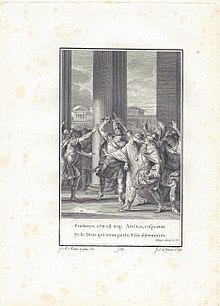Olympics
| Data | |
|---|---|
| Title: | Olympics |
| Genus: | tragedy |
| Original language: | French |
| Author: | Voltaire |
| Publishing year: | 1763 |
| Premiere: | On March 24, 1762 in Voltaire's private theater |
| Place of premiere: | Le Ferney |
| people | |
|
|

Olympie is a tragedy in five acts by Voltaire . The first version of the Olympie was completed by Voltaire in the autumn of 1761 in just six days and was revised by him for the Paris performance in 1764. The first book edition was obtained by Cosimo Alessandro Collini in 1763 based on a manuscript by Voltaire for the performance in the Schlosstheater Schwetzingen on September 30, 1762.
action
The action takes place within the temple area of Ephesus . Olympie grew up as a slave to Cassandre in Babylon and is being prepared for marriage to her master in the Mysteries. Cassandre poisoned Alexander and allegedly also murdered Statira. This, saved by a servant, has survived as a priestess of the temple and recognizes in Olympia her daughter, who was stolen as a child. Statira asks Olympie instead of Cassandre to marry his opponent Antigone, whom she has called for revenge. When the battle between Cassandre's and Antigone's soldiers spreads to the temple, Statira commits suicide. In her conflict between natural motherly love and love for Cassandre, Olympie stabs herself to death and falls at her mother's stake. The shaken Cassandre also kills himself and leaves his rule over the empire of Alexander the great to Antigone.
Literary source and biographical references
Voltaire freely used a few motifs and themes from Hellenistic history. In the plot sequence he was inspired by Jean Racines Athalie , which he regarded as the climax of the French tragedy. Collini reports the working title Cassandre . According to Voltaire's letter to his childhood friend d'Argental on October 20, 1761, the Olympics were written in just six days. D'Argental replied that it would have been better if Voltaire hadn't rested on the seventh day. Voltaire showed insight and revised the Olympie again for the Paris performance of 1764.
Performances and contemporary reception
The tragedy premiered in Voltaire's private theater in Le Ferney on March 24, 1762. Another performance followed on October 30, 1762 in the Schwetzingen Castle Theater. The revised piece was only performed at the Comédie-Française in Paris on March 14, 1764. Despite its considerable success, the Olympics were soon taken off the program. In 1819 Gaspare Spontini set the very freely arranged material of the Olympics to opera in three acts Olimpie .
Going to press
Alessandro Collini, Voltaire's former secretary from 1751 to 1756, was then on Voltaire's recommendation at the court of Schwetzingen as historiographer and secretary to the Count Palatine. Collini, who continued to correspond with Voltaire and knew about his work on the Olympics, requested the tragedy for the Count Palatinate's excellent Mannheim actors at the end of 1761. He also got the first print of the Olympie with the imprint Francfort et Leipsic (sic!) In March 1763.
Additions
Collini preceded the tragedy with an L'avis de l'éditeur . Remarques à l'occasion de cette pièce follow the text of the tragedy .
First editions
- Olimpie, tragédie nouvelle de M. de Voltaire, suivie des remarques historiques , without printer, Frankfurt and Leipzig, 1763, 8 °, VI, 136 pp.
- Olimpie, tragédie nouvelle de M. de Voltaire, suivie des remarques historiques , without printer, Frankfurt and Leipzig, 1763, 8 °, VIII, 119 pp. [1]
- Olympie, tragédie nouvelle de M. de Voltaire, suivie des remarques historiques , without printer, Geneva (probably Belgium), 1763, 8 °, VI, 134 pp. [2]
- Olimpie, tragédie nouvelle de M. de Voltaire, suivie des remarques historiques , without printer, Frankfurt and Leipzig, 1763, 8 °, 98, XVI p.
- Olympie, tragédie nouvelle de M. de Voltaire, suivie des remarques historiques , Knoch and Esslinger, Frankfurt and Leipzig, 1763, 8 °, 92, XVI p.
- Olympie, tragédie nouvelle de M. de Voltaire, suivie des remarques historiques , Knoch and Esslinger, Frankfurt and Leipzig, 1763, 8 °, 76 p. [3]
- Olympie, tragédie nouvelle de M. de Voltaire, suivie des remarques historiques. Représentée pour la première fois par les Comédiens francais ordinaires du Roi, le 14 mars 1764. Nouvelle édition revue et corrigée et conforme à la représentation , Duchesne, Paris, 1764, 8 °, VIII, 119 pp. [4]
literature
- Theodore Besterman : Der Fall Calas (1761–1763), in: Voltaire, Winkler, Munich, 1971, p. 364.
- Éric van Schueren: Olympie, in: Dictionnaire Voltaire, Hachette Livre, 1994, p. 146.
- Siegfried Detemple: Olympia, in: Voltaire: The works. 300th birthday catalog. Reichert, Wiesbaden 1994, p. 152 f.
Web links
Individual evidence
- ↑ See Siegfried Detemple: Voltaire: Die Werke, catalog for the 300th birthday, Berlin, 1994, p. 152.
- ↑ Èric van Schueren: Olympie in: Dictionnaire Voltaire, Hachette Livre, 1994, p 146th
- ↑ Cosimo Alessandro Collini: Preliminary remark to Voltaire's cover letter to the manuscript of January 20, 1762, in: Mon séjour aupres de Voltaire, Gratiot, Paris, 1807, p. 230.
- ^ Avertissement of the editors for the reproduction of the Olympics in the complete edition of the works of Voltaire, Société littéraire-typographique, Kehl, 1784, volume 5, p. 3.
- ^ Theodore Besterman: Der Fall Calas (1761–1763), in: Voltaire, Winkler, Munich, 1971, p. 364.
- ↑ Cosimo Alessandro Collini: Preliminary remark to Voltaire's cover letter to the manuscript of January 20, 1762, in: Mon séjour aupres de Voltaire, Gratiot, Paris, 1807, p. 230.
- ↑ See Siegfried Detemple: Voltaire: Die Werke, catalog for the 300th birthday, Berlin, 1994, p. 152.